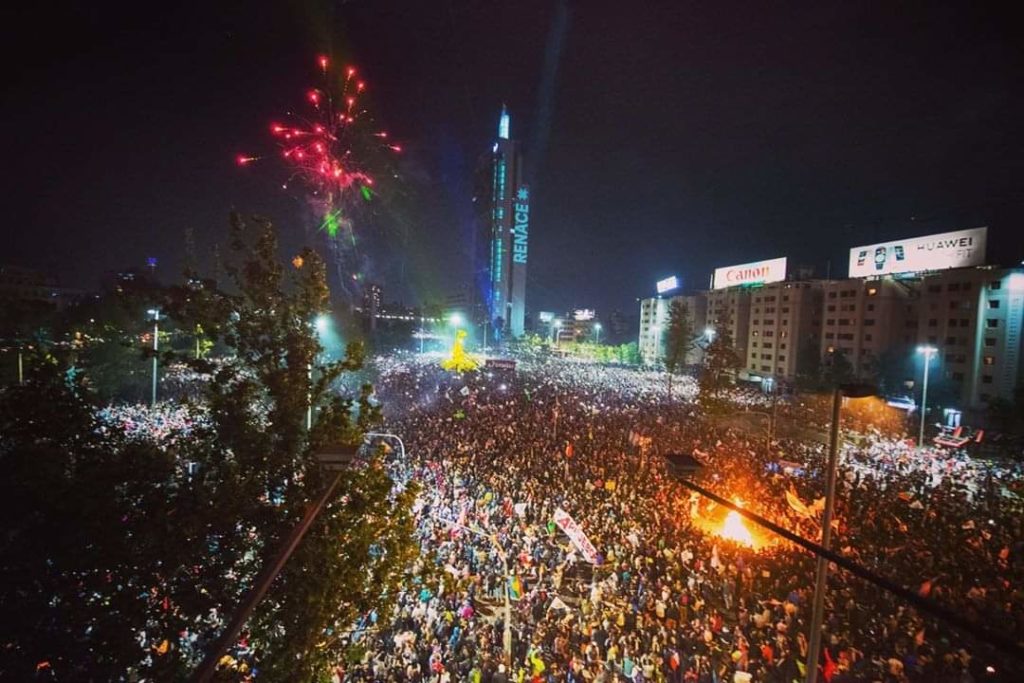On Sunday, a little over a year after the start of the popular uprising that shook the country, Chileans voted overwhelmingly in favor of drafting a new constitution in a nationwide referendum. From Plaza de la Dignidad in the capital of Santiago to the squares in Antofagasta in the north, thousands across the country took to the streets in celebration of this historic win. With 100 percent of the votes counted, 78 percent voted in favor of drafting a new constitution.
The current constitution was written by the military dictatorship of Augusto Pinochet in 1980 and has been maintained with some reforms by the different elected governments following the end of the dictatorship in 1990. Last year, however, sparked by an increase in the subway fares, hundreds of thousands of demonstrators took to the streets in a deafening rebuke of the neoliberal regime. The demand to roll back the fare increase soon spiraled into a demand for deeper change, with the call for the ouster of President Sebastián Piñera and a questioning of the whole political regime — who the masses saw as remnants of the dictatorship. As the popular outcry said, it was “not 30 pesos, it’s 30 years!” The demand for a new constitution soon took center stage.
Sunday’s Referendum: What Was At Stake?
Sunday’s referendum — a direct vote by the entire electorate of the country — was to decide whether or not to write a new national constitution and what bodies or institutions would draft it. The vote was originally scheduled for April of this year, but was postponed due to coronavirus lockdowns. On Sunday, however, Chileans showed up in historic numbers to participate. According to early reports, voter turnout hit a record high since voting was made mandatory in 2012.
In addition to deciding whether to draft a new constitution, voters also had to decide whether the convention to draft the new constitution will be a “constitutional convention,” where 100 percent of the convention delegates are elected in April 2021, or a mixed convention where 50 percent of convention is elected and the other 50 percent is appointed by the current parliament. With almost 80 percent of the vote, voters overwhelmingly opted for a completely elected constitutional convention.
Under both these options, however, the constitutional convention will have severe limits that will impede it from fulfilling the call for a “Free and Sovereign Constituent Assembly.” The new constitution and its norms must be approved by two-thirds majority in the convention, which will likely give veto power to a conservative minority. It cannot put Piñera’s government on trial for the repression, while the supreme court can restrict the breadth of the constitutional reforms. International treaties, which for the most part allow national plundering by big multinational corporations in areas from mining to pensions (the AFPs), can’t be touched. The high schoolers who initiated the enormous popular rebellion last year, will not be able to vote or be elected due to stringent voting-age restrictions. Union and social leaders will not be able to run for office without giving up their roles. Finally, the convention will be elected by the rules of the present parliamentary electoral system — one that benefits the large, corporate parties.
For a constituent assembly to be truly free and sovereign, it must be a product of the self-organization of workers and radical youth, not born of a recycling of old powers.
How Was the Referendum Born?
The referendum was born out of the so-called “Agreement for Peace and a New Constitution” made by the parliament and in agreement with the Piñera government in response to the popular uprising in Chile last year.
The deal was struck in the early hours of November 15 at a time of enormous crisis. Only two days earlier, the country had witnessed the most important national strike in decades, threatening the power of the Piñera government and the entire political regime. It was a historic independent action of the masses with revolutionary characteristics which raised the possibility of the fall of the government.
The strike marked the high point of the popular rebellion that began on October 18 of last year, where millions confronted the government and its repressive forces. For the first time since the dictatorship, the armed forces were out in full force to control the streets under states of emergency and curfews. The uprising left nearly 30 dead and with more than 2,500 political prisoners, hundreds of them still in custody without charge and subject to torture, beatings, and sexual abuse. More than 450 people lost an eye to pellets fired by the armed forces. In fact, 24-year-old Gustavo Gatica lost both eyes to the lead pellets shot by the police while he was reporting on these clashes.
Return to the Path of Mobilization
For over two months, millions fought in the streets across Chile to bring down the entire legacy of the dictatorship. Encapsulated in the call for the “Free and Sovereign Constituent Assembly” and “Out With Piñera,” the rebellion denounced the 30 years of a post-dictatorship transition which has maintained and consolidated its legacy.
The referendum marks an attempt by the current regime to deflect the popular rebellion into an institutional process and contain the uprising. But, with the profound health and economic crisis opened up by the coronavirus pandemic and the subsequent loss of over two million jobs in Chile, the old institutions of the regime continue to be in deep crisis. On Sunday, October 18, more than 100,000 people marched in Plaza Dignidad in Santiago to mark the first anniversary of the popular rebellion, along with thousands more in other parts of the country.
The masses have the strength to take up that path again. However, the Frente Amplio and the Partido Comunista de Chile (Communist Party of Chile, PC) — some of the biggest forces on the left which lead the largest organizations and have electoral weight — are putting all their effort into this institutional road. As seen during the demonstrations for the anniversary of the uprising, they have called on their base to not mobilize in the streets. They continue to maintain and uphold their illusions in the constitutional process, trusting that they can defeat the regime of “30 years” by negotiating with them in this convention. They are also creating new alliances with the old coalitions to “defeat the right.”
The Chilean masses cannot rely on these parties that have been a part of the regime for the last 30 years. It is foolhardy to believe that a constitutional convention that is based on the current electoral process, grants impunity to the repressors, and gives immunity to the very institutions of neoliberalism that have caused misery for the working class and oppressed can deliver on the demands of the rebellion. In fact, Piñera, who was one of the main subjects of the popular ire, hailed this step towards a constitution as a positive step. “Until now, the Constitution has divided us,” he said, “As of today, we should all cooperate to make the new Constitution become one home for all of us.” It is unlikely that any constitution that is going to be a home for Piñera and the current ruling elite will be one that is favorable for the working class and oppressed.
For the millions of radical workers and youth who, through mass action and general strikes, brought Chile to a grinding halt, it is necessary to break from representatives of the neoliberal order and fight for more.
The Party of Revolutionary Workers (PTR), which is behind La Izquierda Diario, has been the only political organization on the left of the PC and FA in this process. The PTR has recently gained electoral legitimacy in Antofagasta, Temuco, Valdivia, Puerto Montt, and, as of this Friday, the Metropolitan Region, Valparaíso and Arica, which will now allow them to participate in the next elections and the process of the convention. They have been actively campaigning for the “Free and Sovereign Constituent Assembly.” With the support of tens of thousands of workers, youth and women nationwide, they not only called for the vote of approval to overthrow Pinochet’s constitution, but also denounced the traps of the constitutional conventions. As one of the leaders of the PTR, Dauno Totoro described it, “We call for an approval (on the first ballot) because we do not want a Pinochet constitution, but on the second ballot, we want it annulled, calling for a Free and Sovereign Constituent Assembly and Out With Piñera.”
Chileans have resoundingly rejected the old order, but it is incumbent that they now remove every trace of the dictatorship. To get the demands of the working people for health, bread, work, pensions, wages, to prevent attacks and precariousness, to confront police repression and brutality, the road of mobilization and the program of rebellion must be taken up again. The force behind the approval of a new constitution must be converted into class struggle to guarantee that the working people do not pay for the crisis.
This article is a translation and adaptation of this article, originally published on our sister site, La Izquierda Diario. Pablo Torres is a leading member of the Partido de Trabajadores Revolucionarios (PTR) in Chile, and editor of La Izquierda Diario Chile.











